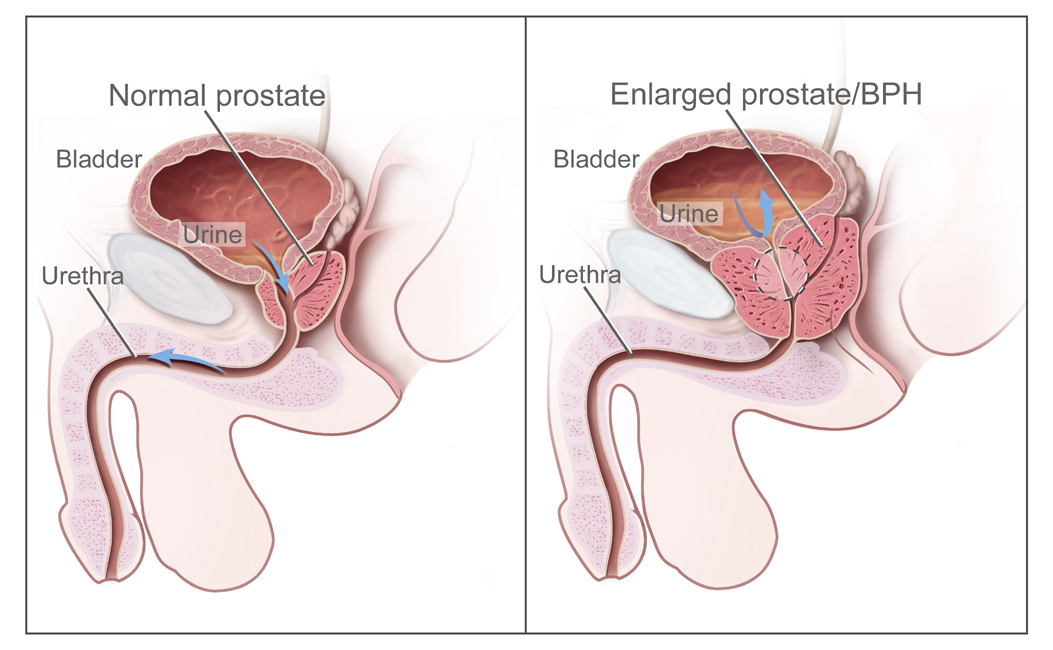Ignoring the symptoms of enlarged prostate gland (medically known as BPH) is a common mistake made by many men. Getting the treatment at an early stage for the enlarged prostate can minimize the chances of complications.

How to Diagnose Enlarged Prostate Gland
Before we get to the enlarged prostate gland's treatments, first let's tell you how to check for this condition. A review of the medical history and a physical exam are performed at the beginning of a BPH diagnosis. The doctor will perform a rectal exam during the physical examination to check the shape and size of your prostate. Other medical tests that might have to be conducted are:
- A culture of your urine to see if there is blood or bacteria in your urine.
- Biopsy of the prostate to check for abnormalities.
- Urodynamic tests to calculate pressure inside your bladder when you urinate.
- Blood test for PSA or prostate-specific antigen to check for presence of prostate cancer.
- Post void residual to check the amount of urine that remains in the bladder after you have urinated.
- Cystoscopy performed by a small camera that helps in examining the bladder and the urethra.
- Ultrasound of the rectal region for ruling out cancer and confirming BPH.
- Intravenous urogram or pyelogram in which CT scan of the entire urinary system is done with a dye.
How to Treat Enlarged Prostate Gland
The severity of your symptoms will decide the treatment that is given to you for prostate gland enlargement. Moreover, the doctor is going to ensure that all of your medical problems are considered when suggesting a treatment plan for you.
Lifestyle modifications, surgery, medicines and careful waiting are some of the treatment options indicated for prostate gland enlargement.
People over 60 might experience symptoms, but most of the patients with large prostates feel only mild symptoms. For such people, self-care steps might be enough to provide relief from the symptoms.
For Mild Symptoms: Self-Care
For mild enlarged prostate gland, treatments like self-care are the best. And here is how to do:
- Not drinking water before sleeping and limiting your consumption of coffee and alcohol can help you in avoiding bathroom trips in the night and keep the urine production low as well.
- Moreover, limiting the use of antihistamines and remaining active can also have a good effect on your body and it will become easier for you to urinate.
- Having a healthy diet and remaining warm can also help you in avoiding urinary retention. Also include exercise regime into your daily life because inactivity can lead to urine retention.
- Make a schedule of when you must visit the bathroom to urinate and follow it as honestly as possible. Practice double voiding method wherein you will have to urinate and then urinate again a few minutes later in an attempt to empty the bladder completely.
- Quitting smoking can reduce your symptoms significantly and performing breathing techniques can help you in taking your mind off of your bladder if you have urgency issues.
- Limit antihistamines or decongestants, which tighten the muscles around the urethra that control urine flow, making it harder to urinate.
Enlarged Prostate - Natural Ayurvedic Home Remedies:
Other Treatment Options
Drugs are among the most widely used method of treatment for prostate enlargement symptoms that range from mild to moderate. The medications that are usually prescribed include:
- Alpha blockers. Medications like doxazosin, silodosin, alfuzosin and tamsulosin are all alpha blockers that relax the muscles present in the bladder neck as well as the prostate, thus making it easier for you to urinate. The side effects that these medications might cause include retrograde ejaculation and dizziness.
- 5-alpha reductase inhibitors. Medications like Avodart and Proscar can help in reducing the size of your prostate by stopping the hormonal changes that are responsible for its growth. The effect of these drugs become clear in about six months' time and retrograde ejaculation is their only side effect
- Combination drug therapy. If both 5-alpha reductase inhibitor and alpha blocker are not working then the doctor might advise you to take both of them at once.
- Tadalafil (Cialis). This medication is traditionally used for patients suffering from erectile dysfunction but can also be used to alleviate the symptoms of BPH as well.
Minimally Invasive or Surgical Therapy
For severe enlarged prostate gland, treatments like surgery are needed, especially if your condition can not be relieved by medications. Moreover, having bladder stones, a urinary tract obstruction or a kidney problem might also warrant a surgical treatment. You should have surgery if you are looking for a permanent solution for your problem.
Surgery might not prove to be successful for you if you suffer from a urethral stricture disease, are a patient of multiple sclerosis or Parkinson’s disease, have had radiation therapy performed on your prostate or have a UTI that is still untreated.
Any type of prostate procedure can cause side effects. Depending on the procedure you choose, complications might include:
Prostate surgery is associated with many complications. You might suffer bleeding, retrograde ejaculation, urinary tract infection, erectile dysfunction, short-term urinating issue and even incontinence although it rarely happens.
